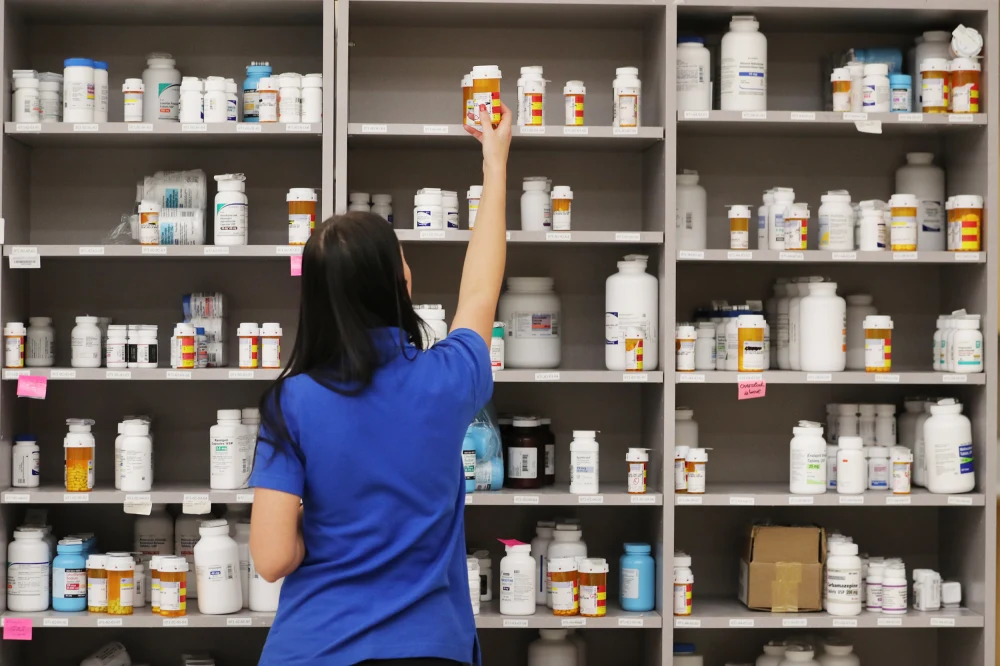A 25% U.S. tariff on pharmaceutical imports could raise U.S. drug costs by nearly $51 billion annually, potentially increasing prices by as much as 12.9% if the costs are passed on to consumers, according to a report commissioned by the pharmaceutical industry’s U.S. trade group and reviewed by Reuters.
The analysis, conducted by Ernst & Young, revealed that in 2023, the United States imported $203 billion worth of pharmaceutical products, with 73% of these imports coming from Europe, mainly Ireland, Germany, and Switzerland. That same year, total U.S. sales of finished pharmaceuticals amounted to $393 billion.
The report, dated April 22 and not made public, was commissioned by the Pharmaceutical Research and Manufacturers of America (PhRMA), the leading U.S. pharmaceutical lobby, which represents major companies like Amgen, Bristol Myers Squibb, Eli Lilly, and Pfizer.
PhRMA did not respond immediately to a request for comment. The group has argued that imposing tariffs would hinder efforts to increase domestic manufacturing, a key objective of former President Donald Trump’s administration.
While pharmaceutical products have traditionally been exempt from trade wars due to their potential to cause widespread harm, Trump repeatedly threatened a 25% tariff on pharmaceutical imports.

Last week, the Trump administration launched investigations into pharmaceutical imports, citing national security concerns due to the country’s reliance on foreign drug production.
The announcement triggered a 21-day public comment period as part of the inquiry led by the U.S. Commerce Department.
Pharmaceutical companies view the probe as an opportunity to demonstrate to the administration that high tariffs could obstruct their efforts to quickly increase domestic production, while also suggesting alternative solutions, according to Ted Murphy, a trade lawyer at Sidley Austin, a firm advising companies on their submissions to the Commerce Department.
Additionally, drugmakers have lobbied the Trump administration to gradually implement tariffs on imported pharmaceutical products in an effort to ease the financial impact.
On Thursday, Swiss pharmaceutical giant Roche announced it is directly petitioning the U.S. government for exemptions from the import tariffs, arguing that its U.S. exports of drugs and diagnostics help offset the products it ships into the country.
The report states that production costs are just one factor influencing the price of newer medicines, and it remains uncertain how much of the impact from tariffs on imported intermediate inputs or finished products would be passed on to consumers.
Tariffs on imported finished products could be passed down to consumers by wholesale or retail distributors who pay the tariffs.
However, if these duties were fully passed on through higher domestic prices, Ernst & Young (EY) estimates that U.S. drug prices could rise by as much as 12.9%.
In 2023, around 30% of pharmaceutical imports consisted of ingredients used in U.S. manufacturing, which are then either exported or sold domestically.
Imposing tariffs on these imports would increase domestic production costs by 4.1% and diminish the global competitiveness of U.S.-made drugs, according to the report.
About 25% of U.S. pharmaceutical production is exported, totaling $101 billion in 2023. EY noted that a portion of the 490,000 export-related jobs in the sector could be jeopardized if higher input costs reduce foreign demand for U.S. medicines.
The report did not factor in the potential impact of retaliatory tariffs, which could have a significantly greater economic effect on U.S. producers.

